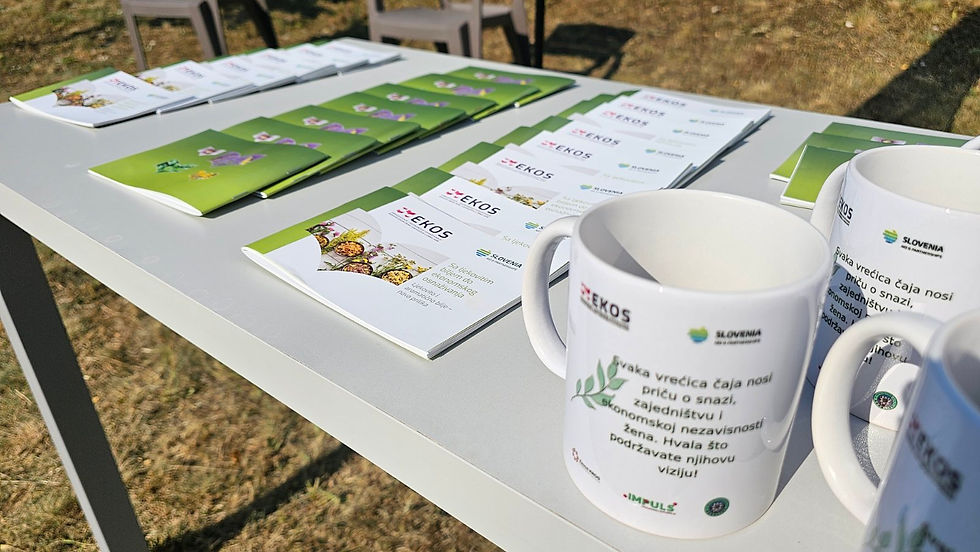THE FIRST RESEARCH ON DEMENTIA IN MONTENEGRO
- Zavod Krog

- Apr 12, 2023
- 4 min read
Dementia, which some call the disease of the 21st century, is a syndrome that manifests itself in a progressive decline in cognitive function. Considering the relatively rapid and extensive process of aging of the human population, the World Health Organization estimates that from today's number of more than 50 million people living with dementia, this number could grow to 82 million people by 2030. Recent reports estimate that every year there are nearly 9.9 million new cases, which translates to one new case every three seconds. For these reasons it is essential that we, as a society, start prioritizing strategies and action plans, which will help people with dementia, their families, and caregivers, to get adequate support and help needed.
Considering the awareness of the urgency of the issue, Institute Circle, together with our partner NVU Impuls from Montenegro, is implementing the project "Protecting of the right to dignified ageing and dementia preventing" in the north of Montenegro, with the support of the Delegation of the European Union to Montenegro, Ministry of Foreign and European Affairs of the Republic of Slovenia and Ministry of Public Administration of Montenegro. Through educating and mentoring of volunteers to provide lay psychosocial support, we want to create a sustainable system of wide social support that would make daily coping easier for the elderly with dementia, their families, and caregivers.
In view of the alarming forecasts, many European countries have already adopted various strategies and plans that include measures for people with dementia, but unfortunately this is not yet the case for Montenegro. Additionally, Montenegro does not yet have a register of people with dementia, so the actual situation and number of people in need of help is unknown. One of the most important activities of the project was therefore the mapping of people with dementia in the north of Montenegro (Nikšić, Plužine, Šavnik, Plav and Gusinje), which represents the first such survey in the country.
Important statistical and research data on dementia have been collected and summarized, which will serve as a basis for laws and strategies at both national and local level regarding systemic care and support for people with dementia and their family members.
It turned out that the concept of dementia in Montenegro is not understood and is treated only as a symptom of aging, and as such not enough attention is paid to it. There is not a single strategic act in the country aimed at directly protecting the people with dementia and supporting their families, who bear the greatest impact.
The study revealed the urgent need for a register of people with dementia, their number, status, and quality of life, because without it they remain an invisible group of elderly. Through our project, with the help of volunteer education and awareness campaigns, we are directing all our efforts to ensure that citizens and, above all, decision-makers recognize dementia as a serious progressive disease that, in addition to the individual, affects the quality of life of all family members who, due to the need for constant care for the person with dementia, are in high risk of burnout. As many as 70.7 % of the caregivers included in the study report great physical and mental fatigue due to the long-term care of a family member who requires constant attention and help.
The mapping showed that in Montenegro there is also a lack of training for professional staff dealing with this population, and cooperation between sectors that would enable quality care for people with dementia is not developed. People living with dementia do not have the right to a care and assistance allowance, disability allowance, one-time cash assistance, or public transport benefits. It is necessary to legally include people with dementia as a separate subgroup of the elderly and to enable them to access the rights that are available: the right to day care in municipalities that offer this option, the right to caregivers and/or volunteers for daily assistance.
The families will always play a special role in the care of people with dementia, but they remain overlooked and as such overburdened, as their basic psychophysical and material needs are not met due to the 24-hour need for assistance. The alarming data revealed by our research is that more than half of families or caregivers have only occasional income or no income at all, which clearly indicates the need for additional support for families of people with dementia. Interviews conducted with professionals in the field of working with people with dementia show that the development and implementation of a sustainable long-term care program for the elderly, new day care centres and the training of volunteers to offer additional support and assistance is urgently needed, all of which will at least partially relieve the challenges posed on families and caregivers.
The mapping carried out in the north of Montenegro by Institute Circle and NVU Impuls is a pioneering work in the country. A strong wish of the project implementers and all participating volunteers is that it can serve as an example with practical value for the whole of Montenegro and the wider region. It represents a big step forward in the recognition of people living with dementia, which is the basis for an organizational system or the introduction of legislation that will enable people with dementia and their families to have the inalienable right to a better and dignified life and aging.










Comments